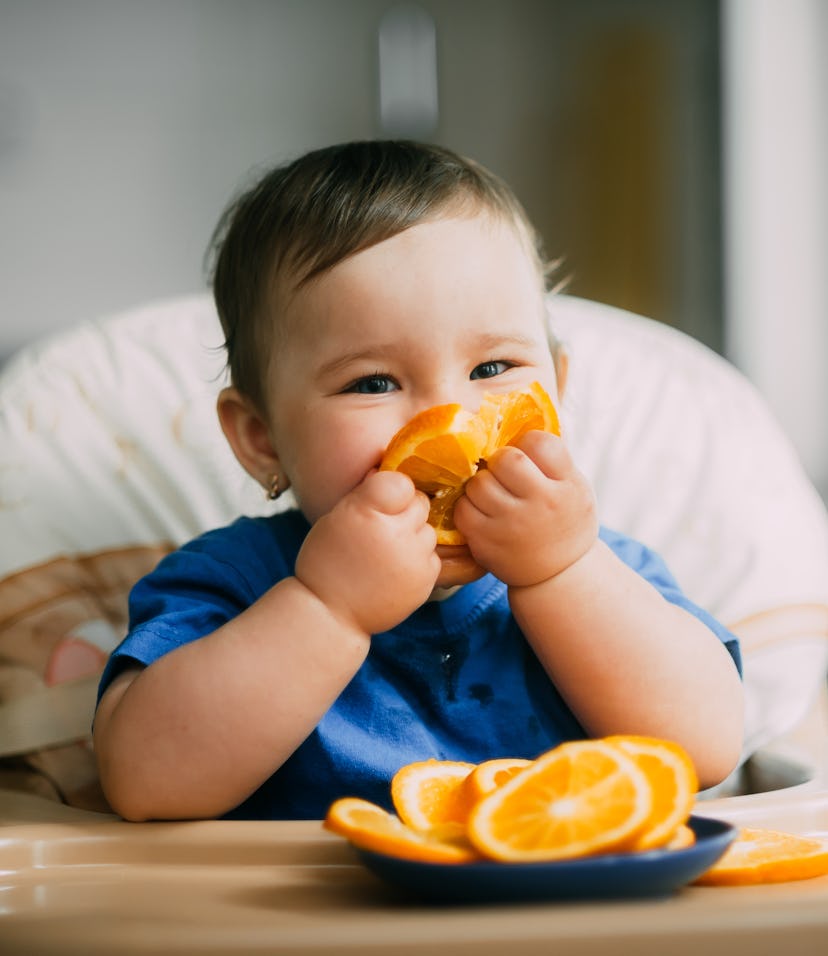Food

When Can Your Baby Have Orange Juice?
Experts weigh in on giving babies juice — or not.
Orange juice — made from vitamin-rich fruit, full of bright color — seems to be the very definition of what to drink for a healthful diet, right? But when it comes to babies, juice isn’t so simple. So I had to ask the experts: When can babies have orange juice? Not only are there the health considerations when it comes to giving babies orange juice — such as fiber, sugar content, and calorie count — but also your baby’s developmental stage, allergic reactions, and more.
When Can Babies Have Orange Juice?
Pediatricians widely agree that babies should have breast milk or formula exclusively for the first six months of life. “After this age, most U.S. pediatricians recommend slowly introducing solid — pureed — foods into the child’s diet. When one begins the fruit, it’s OK to also begin the juice of that fruit,” says Dr. Robert Hamilton, MD, a pediatrician at Providence Saint John’s Health Center in Santa Monica, California. But here’s where things get sticky, he says. “Parents should understand that juice only — without the benefit of the fruit pulp — is a high-sugar, high-caloric meal.” Especially if it’s store-bought.
The sugar and calorie content of juice concern pediatricians enough that they would delay introducing juice even longer than 6 months. Dr. Sharifa Glass, MD, a national board-certified pediatrician and owner of The Vine Pediatrics and Lactation, tells Romper that babies can have orange juice after they’re a year old. “The American Academy of Pediatrics recommends no juice consumption for children less than 12 months of age due to minimal nutritional value compared to fresh fruit and children’s preference for this sweet drink over breast milk, infant formula, and food,” she says. “The AAP also recommends limiting juice to 4 ounces per day after children reach this age.”
Dr. Gina Posner, MD, a board certified pediatrician at MemorialCare Orange Coast Medical Center in Fountain Valley, California, tells Romper that there’s no need for juice ever, and she thinks of it as “vitamin-fortified soda.” Posner suggests giving them whole fruit after they’re 6 months old, when they start being introduced to solids. “Eating the fruit gives you plenty of fiber while juice just gives you added calories and sugar,” she says. Your baby is still getting fruit juice from eating the whole orange, which includes fiber for good digestion.
The Best Way To Serve Juice To Babies
If you do still want to give your child juice, how is the best way to serve it? Are there some juices that are healthier than others? Posner says that whatever the juice type, you should definitely dilute it. “I would give almost no juice and lots of water. In fact, I would water it down for as long as you can get away with it because it will be far healthier for your child in the long run,” she says.
Hamilton says that parents should dilute fruit juices with 1:1 water and minimize the volume of these juices to 4 to 6 ounces per day.
If your baby is suffering from constipation, try serving more water and pureed whole fruit for the fiber. If those fail to improve the situation after three days, juice might do the trick.
And don’t forget that any food can cause an allergic reaction. “When introducing a new fruit juice, it should contain one fruit instead of fruit mixtures. Caregivers should allow about three days to assess for allergic reactions before adding a new fruit to their child’s diet,” Glass says.
How To Make Your Own Juice For Baby
Glass says that babies can have freshly squeezed juice from home when they’re a year old. “Juice that is blended from fresh fruit and strained at home is the healthiest for your child when compared to store brands because it is free from preservatives and added sugar,” she says. If you have a juicer, all the better.
Bottom line: Babies should have breast milk or formula the first 6 months of their life. Try to stay away from store-bought juice as much as possible because it often has added sugar and preservatives. Pediatricians recommend juicing or pureeing whole fruit if possible.
Experts:
Dr. Robert Hamilton, a pediatrician at Providence Saint John’s Health Center in Santa Monica, California and host of the podcast The Hamilton Review: Where Kids and Culture Collide.
Dr. Sharifa Glass, a national board-certified pediatrician and owner of The Vine Pediatrics and Lactation.
Dr. Gina Posner, a board certified pediatrician at MemorialCare Orange Coast Medical Center in Fountain Valley, California.